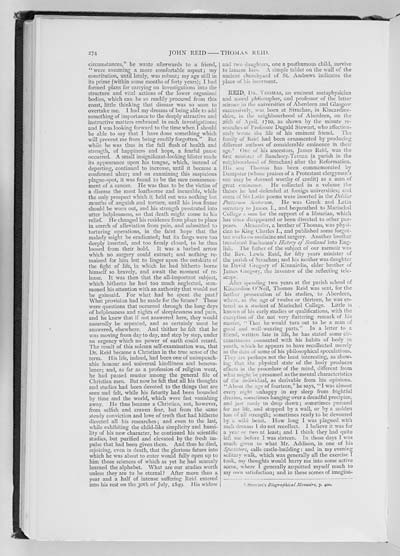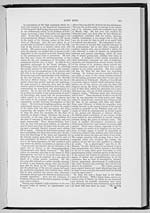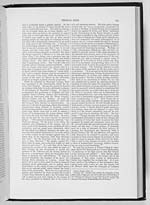274
circumstances," he wrote afterwards to a friend,
"were assuming a more comfortable aspect; my
constitution, until lately, was robust; my age still in
its prime (within some months of forty years); I had
formed plans for carrying on investigations into the
structure and vital actions of the lower organized
bodies, which can be so readily procured from this
coast, little thinking that disease was so soon to
overtake me. I had my dreams of being able to add
something of importance to the deeply attractive and
instructive matters embraced in such investigations;
and I was looking forward to the time when I should
be able to say that I have done something which
will prevent me from being readily forgotten." But
while he was thus in the full flush of health and
strength, of happiness and hope, a fearful pause
occurred. A small insignificant-looking blister made
its appearance upon his tongue, which, instead of
departing, continued to increase, until it became a
confirmed ulcer; and on examining this suspicious
plague-spot, it was found to be the sure commence-
ment of a cancer. He was thus to be the victim of
a disease the most loathsome and incurable, while
the only prospect which it held out was nothing but
months of anguish and torture, until his iron frame
should be worn out, and his strength prostrated into
utter helplessness, so that death might come to his
relief. He changed his residence from place to place
in search of alleviation from pain, and submitted to
torturing operations, in the faint hope that the
malady might be eradicated; but its fangs were too
deeply inserted, and too firmly closed, to be thus
loosed from their hold. It was a barbed arrow
which no surgery could extract; and nothing re-
mained for him but to linger upon the outskirts of
the fight of life, in which he had hitherto borne
himself so bravely, and await the moment of re-
lease. It was then that the all-important subject,
which hitherto he had too much neglected, sum-
moned his attention with an authority that would not
be gainsaid. For what had he spent the past?
What provision had he made for the future? These
were questions that occurred through the long days
of helplessness and nights of sleeplessness and pain,
and he knew that if not answered here, they would
assuredly be repeated, and as certainly must be
answered, elsewhere. And thither he felt that he
was moving from day to day, and step by step, under
an urgency which no power of earth could retard.
The result of this solemn self-examination was, that
Dr. Reid became a Christian in the true sense of the
term. His life, indeed, had been one of unimpeach-
able honour and universal kindliness and benevo-
lence; and, as far as a profession of religion went,
he had passed muster among the general file of
Christian men. But now he felt that all his thoughts
and studies had been devoted to the things that are
seen and felt, while his futurity had been bounded
by time and the world, which were fast vanishing
away. He thus became a Christian, not, however,
from selfish and craven fear, but from the same
steady conviction and love of truth that had hitherto
directed all his researches; and even to the last,
while exhibiting the child-like simplicity and humi-
lity of his new character, he continued his scientific
studies, but purified and elevated by the fresh im-
pulse that had been given them. And thus he died,
rejoicing, even in death, that the glorious future into
which he was about to enter would fully open up to
him those sciences of which as yet he had scarcely
learned the alphabet. What are our studies worth
unless they are to be eternal? After more than a
year and a half of intense suffering Reid entered
into his rest on the 3Oth of July, 1849. His widow
and two daughters, one a posthumous child, survive
to lament him. A simple tablet on the wall of the
ancient churchyard of St. Andrews indicates the
place of his interment.
REID, DR. THOMAS, an eminent metaphysician
and moral philosopher, and professor of the latter
science in the universities of Aberdeen and Glasgow
successively, was born at Strachan, in Kincardine-
shire, in the neighbourhood of Aberdeen, on the
26th of April, 1710, as shown by the minute re-
searches of Professor Dugald Stewart, who affection-
ately wrote the life of his eminent friend. The
family of Reid had been ornamented by producing
different authors of considerable eminence in their
age.1 One of his ancestors, James Reid, was the
first minister of Banchory-Ternan (a parish in the
neighbourhood of Strachan) after the Reformation.
His son Thomas has been commemorated by
Dempster (whose praises of a Protestant clergyman's
son may be deemed worthy of credit) as a man of
great eminence. He collected in a volume the
theses he had defended at foreign universities; and
some of his Latin poems were inserted in the Deliti�
Poetarum Scotorum. He was Greek and Latin
secretary to James I, and bequeathed to Marischal
College a sum for the support of a librarian, which
has since disappeared or been directed to other pur-
poses. Alexander, a brother of Thomas, was physi-
cian to King Charles I., and published some forgot-
ten works on medicine and surgery. Another brother
translated Buchanan's History of Scotland into Eng-
lish. The father of the subject of our memoir was
the Rev. Lewis Reid, for fifty years minister of
the parish of Strachan; and his mother was daughter
to David Gregory of Kinnairdie, elder brother of
James Gregory, the inventor of the reflecting tele-
scope.
After spending two years at the parish school of
Kincardine O'Neil, Thomas Reid was sent, for the
further prosecution of his studies, to Aberdeen,
where, at the age of twelve or thirteen, he was en-
tered as a student of Marischal College. Little is
known of his early studies or qualifications, with the
exception of the not very flattering remark of his
master, " That he would turn out to be a man of
good and well-wearing parts." In a letter to a
friend, written late in life, he has stated some cir-
cumstances connected with his habits of body in
youth, which he appears to have recollected merely
as the data of some of his philosophical speculations.
They are perhaps not the least interesting, as show-
ing that the physical state of the body produces
effects in the procedure of the mind, different from
what might be presumed as the mental characteristics
of the individual, as derivable from his opinions.
"About the age of fourteen," he says, "I was almost
every night unhappy in my sleep from frightful
dreams, sometimes hanging over a dreadful precipice,
and just ready to drop down; sometimes pursued
for my life, and stopped by a wall, or by a sudden
loss of all strength; sometimes ready to be devoured
by a wild beast. How long I was plagued with
such dreams I do not recollect. I believe it was for
a year or two at least; and I think they had quite
left me before I was sixteen. In those days I was
much given to what Mr. Addison, in one of his
Spectators, calls castle-building: and in my evening
solitary walk, which was generally all the exercise I
took, my thoughts would hurry me into some active
scene, where I generally acquitted myself much to
my own satisfaction; and in these scenes of imagina-
1 Stewart's Biographical Memoirs, p. 400.

![]() Universal Viewer |
Universal Viewer | ![]() Mirador |
Large image | Transcription
Mirador |
Large image | Transcription
![]()

